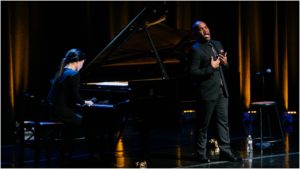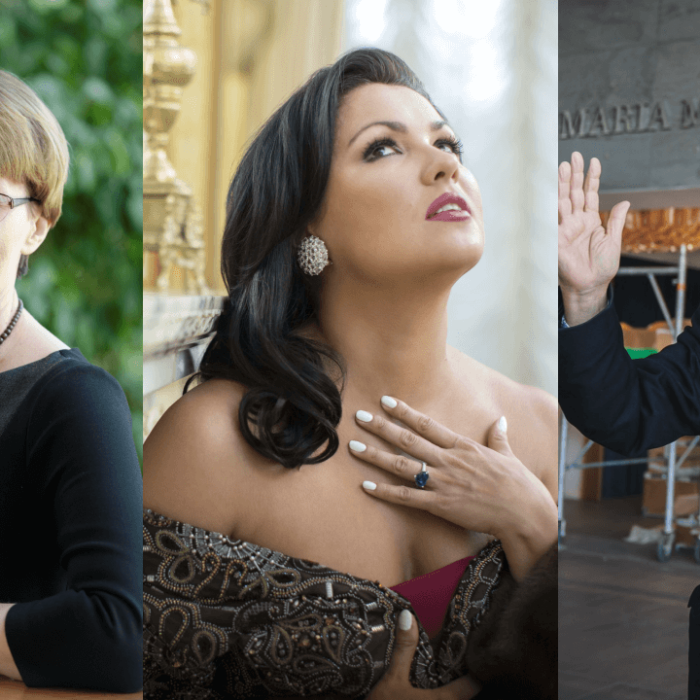
Editorial: Searching For A Greater Meaning in Lawrence Brownlee’s “Cycles of My Being”
By Santosh VenkataramanIs art merely a form of entertainment or can it serve a greater purpose? Many people believe the latter is true although it’s possible that they are deluding themselves in order to partake in something they enjoy. It’s a question that can be debated forever.
It came to mind for me this past week when I attended Lawrence Brownlee’s “Cycles of My Being” at the DuSable Museum of African-American History in Chicago in an event presented by Lyric Opera of Chicago. This was on Thursday night – two nights after Brownlee debuted the piece at Opera Philadelphia.
Brownlee has spoken to numerous outlets about the genesis of the piece, including an interview with OperaWire earlier this month. It was composed by Tyshawn Sorey with lyrics by Terrance Hayes; both are black men who are renowned as recipients of MacArthur fellowships.
This cycle of six songs had four adapted from sonnets written by Hayes with the other two written by Brownlee himself. As I watched the performance, I wondered about its impact. And I wondered in particular about who in our audience would gain the most from the evening.
What is the Value of an Artist’s Perspective?
How much of an effect the opinions of celebrities have is certainly topical in today’s climate. Not too long ago, Fox commentator Laura Ingraham famously told LeBron James to “Shut up and dribble” after the NBA star voiced his political opinions.
No such partisan bent emanated in these thoughtful verses from Brownlee that were about the experience of being a black man in the United States. And Brownlee has been quick to explain that his hope is be a small part of positive change in the world.
It’s a sentiment that has been echoed by other artists. Mezzo-soprano Joyce DiDonato’s recent tour of her “In War and Peace” album is an example with its billing of finding harmony through music in an assortment of baroque arias. But again, was the message merely being presented to a self-indulgent audience of music lovers or could it indeed have greater meaning?
Minimalist Feel to the Proceedings
All this was on my mind when the moderator for the event made a well-meaning but unfortunate choice before introducing Brownlee and pianist Myra Huang. Noting the diverse nature of the crowd in Chicago’s South Side in a location far from Lyric’s familiar Civic Opera House, she asked everyone to shake hands with someone next to them.
I winced at this suggestion although I complied. It’s the sort of gesture that implies an artificial togetherness that is simply not present. It also ran counter to one of the themes of the music – how black men are alone in their struggle, an idea embodied by the lines in the first song addressed to America itself – “Do you love the air in me, as I love the air to you?”
The cycle was presented in Chicago with only the piano accompaniment as opposed to the premiere in Philadelphia which also featured a violin, cello and clarinet. This resulted in an even greater focus on Brownlee’s ability to intone the lyrics that had been so painstakingly created.
The Real Meaning of Brownlee’s Work?
As much as Brownlee inserted himself into the first part of the evening, which was the song cycle, his perspective was very much a part of the second part that consisted of more familiar offerings. That is because in addition to performing Donizetti arias as well as the spiritual “Every Time I Feel the Spirit,” Brownlee made a choice that may have been the most important of the night.
Rather than just perform, he grabbed a microphone and talked about his background and how he grew up in a large family and was influenced by church music. He told the story of how the song, “All Night, All Day” was for how angels were watching over his son, who was diagnosed with autism.
Now this was an even more complete picture of Lawrence Brownlee the man, and his desire to “break the fourth wall” humanized him even further. It was far from an empty feel-good gesture because now Brownlee wasn’t speaking to the crowd as much as he was speaking with them. And I believe through this that I was able to catch a glimpse of the real meaning of this night.
I had noted many black kids carrying backpacks and bookbags entering the auditorium. This had to be an amazing opportunity for them to see an opera singer of the caliber of Brownlee in a more relaxed and intimate setting. The fact that Brownlee opened himself to his audience was even better.
This was the part of the audience that mattered because it is clear how we are dependent on the next generation to fix what we could not. It’s something I have thought about a lot as I have aged. When I see calamities on the news, I remind myself that it’s my fault. Because at this age, as an adult, how can I blame anyone else? It may not be comfortable, but it is truthful.
And as we have seen children rise to the occasion in the recent shootings in Parkland, Florida, it is a reminder of how we have fallen short as adults. Brownlee’s objective was to reach the younger generation because they are tasked with succeeding where we have failed.
I hope that he succeeded on this night.
Categories
Editorials

